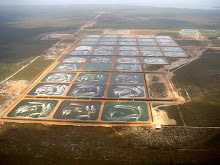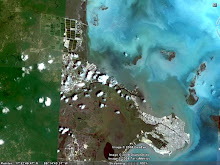 Here is some text from a grant that outlines some of the issues and problems we're hoping to solve.
Here is some text from a grant that outlines some of the issues and problems we're hoping to solve. Protecting the Mesoamerican Reef: Nutrient abatement for shrimp farm waste effluent
Belizean shrimp producers are world-wide leaders in sustainable shrimp aquaculture in developing nations, but specific problems remain within the industry.
Belizean shrimp producers are world-wide leaders in sustainable shrimp aquaculture in developing nations, but specific problems remain within the industry.
http://healthyreefs.org/Report_Card/Report_2008/Report_2008index.html
Affecting the global environment and the international shrimp ecocertification movement
A global effort by the FAO, UNEP, NACA, the World Bank and WWF is now underway to create ecocertification criteria, indicators, and standards for the culture of P. vannamei. Ecocertification uses global market forces to subsidize environmental protections by providing premium prices and markets to shrimp farmers that meet specific criteria for environmental sustainability. Ecocertification costs are paid by the producer and represent no cost to local governments.
Affecting the global environment and the international shrimp ecocertification movement
A global effort by the FAO, UNEP, NACA, the World Bank and WWF is now underway to create ecocertification criteria, indicators, and standards for the culture of P. vannamei. Ecocertification uses global market forces to subsidize environmental protections by providing premium prices and markets to shrimp farmers that meet specific criteria for environmental sustainability. Ecocertification costs are paid by the producer and represent no cost to local governments.
This project seeks to address specific environmental problems on Belizean shrimp farms by developing cost-effective means to improve effluent water quality. We will accomplish this goal by recycling nutrients from pond waste effluent back into feed for juvenile shrimp. The shrimp species P. vannamei is an omnivorous grazer and facultative filter feeder that readily consumes biofilms, bacteria and algae. Farms increase shrimp growth by adding commercial feeds to ponds. Waste nutrients from feeds exit ponds and enter effluent canals during rain events and pond drainings. By recycling waste nutrients from effluent canals back into production in the form of consumable biomass, project outputs will contribute to the economic sustainability of shrimp farms and improve the likelihood of technology adoption.
Substrates used for peiphyton growth will include Aqua Mats (a commercially produced substrate for shrimp farms), arrays of PVC pipes, and oyster culture strings. Local shrimp producers have donated the use of 30,000 Aqua Mats. Boats will be provided by the Southern Environmental Association, a Belizean environmental NGO. Urbana University High School Inventor’s Club in the US and Independence High School Environmental Biology class in Belize will monitor and participate in project implementation and design. Results will also be transmitted to the International Dialogue on Responsible Shrimp Aquaculture as an example of community-based monitoring, cooperation and mitigation of measureable environmental effects of shrimp farming. Project data will be suitable for peer review and publication.




Out of curiosity: is the lack of ecocertification for shrimp farms a cause or result of the limited funds available (or at least in Belize)?
ReplyDeleteThis is the non-allen elizabeth, by the way
Hi Non-Allen Elizabeth.
ReplyDeleteIt's a bit of a chicken and egg situation. Shrimp prices are low, so there are limited profits available to improve farms. The remaining environmental problems in shrimp aquaculture discourage "green" buyers from paying extra for "green" shrimp. Those problems could probably be fixed, but without money to fix them they remain.
Somewhere the ecocertification movement has to break the cycle and encourage investment in technologies that improve critical areas of performance.
There ARE shrimp farms in Belize that have received a variety of different ecocertifications. Others are working on ecocertification and getting close to that point. What the farms have rarely received is an increased price for ecocertified shrimp. The "green" market has not yet recognized the value of ecocertified shirmp to the point that they are willing to pay more for it. The advice from environmental groups so far has been to stay away from shrimp produced in developing nations.
So the standards for ecocertification have to be high enough to convince "green" buyers to pay more for "green" shrimp.
What is unique in Belize is that:
1) Local NGOs are now participating in the farm's efforts to improve their environmental performance. Other ecocertification efforts have relied only on governmental and farm data to determine ecocertification status. NGOs are independent (hopefully more objective) observers who live in communities affected directly by the farms.
2) The density of farms is relatively low and therefore the overall impact of farms could be kept low.
3) If a few things like effluents can be cleaned up, Belize has the potential to be one of the most sustainable shrimp producers in the world.
So in addition to helping the environment and pacifying our mangrove friends and producing shrimp food, we could drive up prices for eco-friendly shrimp. Sweet.
ReplyDeleteDo we have some contact with the NGO's? I suppose the high school in Belize will serve as our community contact-- but are the NGOs primarily employees of the farm or merely citizens who are affected by the impact of the shrimp farms?
Thanks for the questions and comments
ReplyDeleteThe Non-Governmental Organization that is the primary contact here is the Southern Environmental Alliance of Bezlie (SEA, formerly FoN or Friends of Nature). Their website is here...
http://www.friendsofnaturebelize.org/AboutUs.htm
The director of SEA grew up as a fisherman in Monkey River Village, went off to University and has worked with various Port Authorities around Central America. The majority of the employees there are Belizean citizens who live and work in the communities around the farms The board is comprised of local community leaders such as the mayors, and business and environmental leaders. These are successful, competant, hard-working people who have run 2 national parks since 2003 and have recently taken on responsibility for a third. I have been doing research as a partner with them since 2003. We'll meet some members of SEA as we go forward.
Also allow me to refine a few perceptions here.
1. We won't be driving up shrimp prices the way it normally happens in the market. Certification depends on consumers who are willing to pay more for a product because they know it has been produced in a way that is preferable to other production methods. You may have seen Fair-Trade or Organically Grown coffees in the grocery store. Those cost a bit more than other coffees, but they are produced in ways that reduce chemical use and improve working conditions for the coffee growers. Ecocertified shrimp can work the same way. The price increase from certification only exists because some consumers (hopefully MANY consumers) care about the environment and will pay a little more for products that are environmentally friendly. A 10% increase in price would represent a few cents for a purchase of shrimp for us, but a huge financial gain for the farms.
2. We aren't really trying to pacify anyone. Various groups will react to our project in various ways. Hopefully they agree with our goals and will be supportive, but you can never predict exactly how you will be received. The stakes are high for a project like this. Reputations and jobs (both in the farms and in the fisheries and other natural resource based sources of incomes around the farms) are on the line. We should stay respectful, stay focused on our technical goals, and do our best to understand other perspectives no matter how other people react. We should not be surprised if we encounter hostility here or there. When you work in a setting unfamiliar to you, it's very easy to step on other people's toes. Keep an open mind, try to understand new perspectives.
2. It should be emphasized that the environmental goals here are important ones. The success of any environmental project will be judged on its' positive effects on the environment. The potential for environmentally consious consumers to pay more for "green" shrimp is directly linked to the effects of shrimp farming on the environment. Coastal lagoons are nursery grounds for important commercial fisheries in Belize and they harbor rare and endangered species like West Antillean Manatee, Morelet's crocodile and others. High nutrient waste waters from the farms are a real threat to those habitats. The people of Belize have traditionally depended on these resources first as fishers, and now as a way to attract eco-tourism dollars. The amount of income generated by eco-tourism in Belize is approximately ten times the amount of income generated by shrimp farming.
3. The role of Independence High School will evolve as we go forward here based on their own needs and goals. I haven't heard back from them yet about this specific project so we don't know yet exactly what their role will be. However this evolves, the 2 schools will be supporting each other as equal partners.
Noted. Thanks for constantly monitering the site! Wow.
ReplyDelete